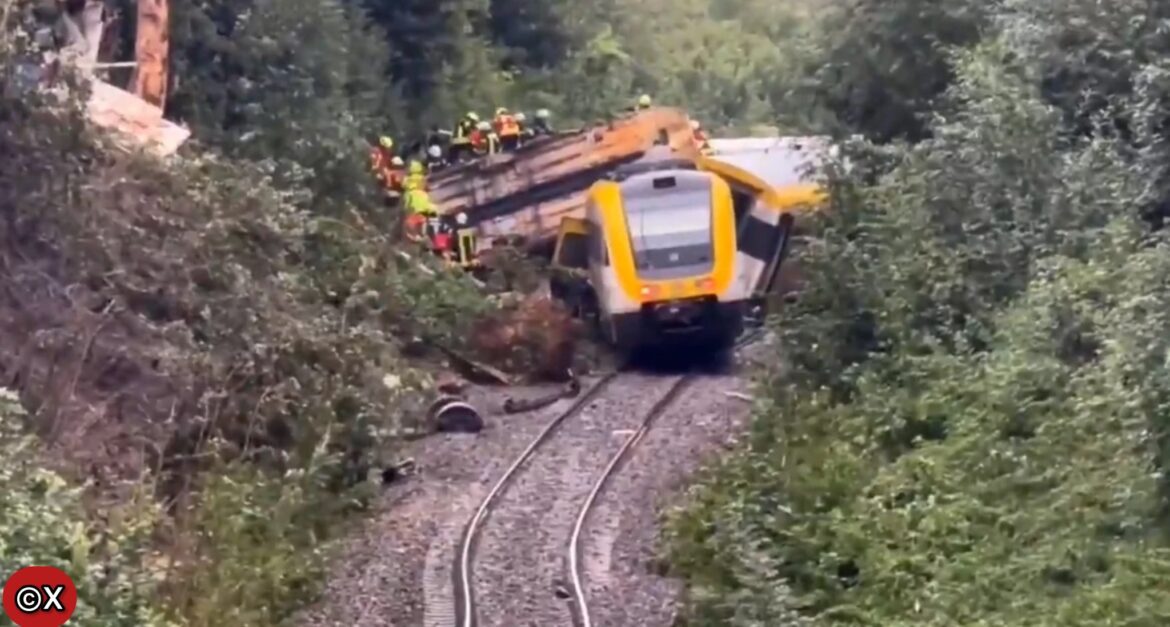A regional passenger train carrying approximately 100 people derailed in south-west Germany on Sunday evening, killing three people including the train driver and injuring at least 50 others, with authorities investigating whether heavy rainfall triggered a fatal landslide.
The RE55 regional express train crashed near Riedlingen in Baden-Württemberg at approximately 6.10pm local time, roughly 12 miles from the French border and 98 miles west of Munich. Two carriages of the Deutsche Bahn service derailed in a forested area between Zwiefaltendorf and Zell whilst travelling from Sigmaringen to Ulm.
Among the dead were the train driver, another Deutsche Bahn employee, and a passenger, police confirmed in a joint statement with federal authorities and prosecutors. Charlotte Ziller, the district fire chief, told reporters that 50 people sustained injuries in the crash, with 25 suffering serious wounds requiring immediate hospitalisation.
German Chancellor Friedrich Merz expressed his shock at the tragedy, posting on X: “The train accident in the Biberach district shocks me. I am in close contact with the Interior Minister and the Transport Minister and have asked them to support the rescue forces with all available means. We mourn the victims. I express my condolences to their relatives.”
Initial investigations suggest the derailment was caused by weather-related conditions following heavy storms in the region. Police reported that a sewage shaft had overflowed after intense rainfall, potentially triggering a landslide in the embankment directly adjacent to the railway tracks.
There have been heavy rains here, so it cannot be ruled out that the heavy rain and a related landslide accident may have been the cause,” Baden-Württemberg’s Interior Minister Thomas Strobl told reporters at the scene. “However, this is currently the subject of ongoing investigations.”
A police spokesperson told German media that mud and debris from the landslide had been swept onto the railway line, with the regional express running over the material before derailing several metres later. Photographs from the scene showed yellow and grey carriages lying on their sides amid fallen trees, with rescue workers climbing atop the overturned cars.
Hundreds of emergency personnel worked through Sunday night into Monday morning, including local and federal police, firefighters, and medical teams. Rescue helicopters transported the most severely injured to hospitals in Ulm and surrounding areas, whilst emergency doctors from nearby medical facilities were placed on alert.
Interior Minister Strobl, who attended the scene on Sunday evening, confirmed all passengers had been evacuated from the carriages. However, he warned that recovery crews needed to move all train cars to ensure no one remained trapped beneath the wreckage, stating: “Currently, we have three deaths. In addition, several dozen injured, including several seriously.
The Ulm emergency services deployed their Mass Incursion of Injured unit, a specialised roll-off container capable of treating 25 injured people simultaneously. The device, originally purchased for the 2006 World Cup in Germany, proved crucial in managing the scale of casualties at the remote woodland location.
Deutsche Bahn CEO Richard Lutz expressed deep shock at the tragedy, saying: “All of us at Deutsche Bahn are deeply shocked and dismayed by the serious train accident with several dead and injured today near Riedlingen in Baden-Württemberg. My deepest sympathy and sympathy go out to the relatives of the deceased.”
The company confirmed on X that “the exact situation is still unclear at this time”, adding: “Our thoughts and sympathies are with the victims and everyone who now have to process this experience.” Lutz announced he would visit the accident site on Monday alongside other senior officials.
Federal Transport Minister Patrick Schnieder described the scene as “shocking”, stating that the full extent of the accident remained unclear. Our experts are on their way to investigate the cause of the accident together with local authorities,” he confirmed, as the Federal Bureau of Railway Accident Investigation (BEU) opened a formal inquiry.
Baden-Württemberg’s Minister-President Winfried Kretschmann called the incident “a tragic piece of news” and pledged a thorough investigation into the cause. He was expected to visit the site on Monday alongside Transport Minister Winfried Hermann and other high-ranking officials.
A collection point for relatives was established at the Daugendorf Community Centre in Riedlingen, with helplines set up by both Ulm police and Deutsche Bahn to provide support and information to affected families. Local authorities praised the swift response of emergency services despite challenging conditions in the forested terrain.
Train services between Munderkingen and Herbertingen have been suspended indefinitely, disrupting operations on the important regional RE55 route connecting Ulm, Donaueschingen, and Sigmaringen. Replacement bus services are operating between Herbertingen and Munderkingen, whilst trains continue running on unaffected segments.
The derailment marks one of Germany’s most serious rail accidents in recent years, raising questions about infrastructure resilience during extreme weather events. With climate change bringing increasingly frequent heavy rainfall to the region, authorities face mounting pressure to strengthen railway embankments and drainage systems.
As investigations continue, the accident has reignited debate about Germany’s ageing rail infrastructure and the need for modernisation. The tragedy serves as a stark reminder of the vulnerability of transport networks to extreme weather conditions, particularly in rural and forested areas where landslides pose increasing risks.
Follow for more updates on Britannia Daily



